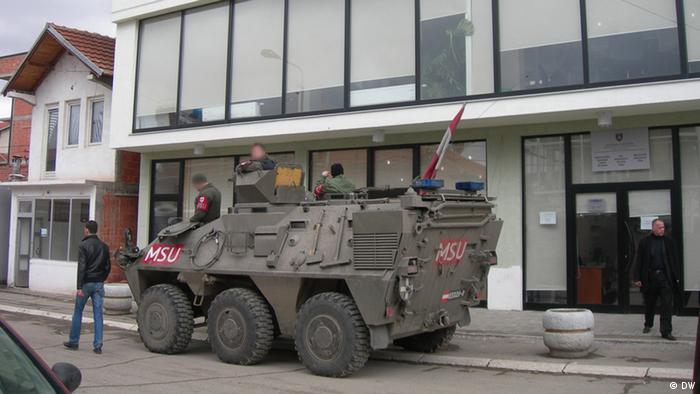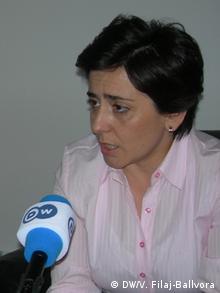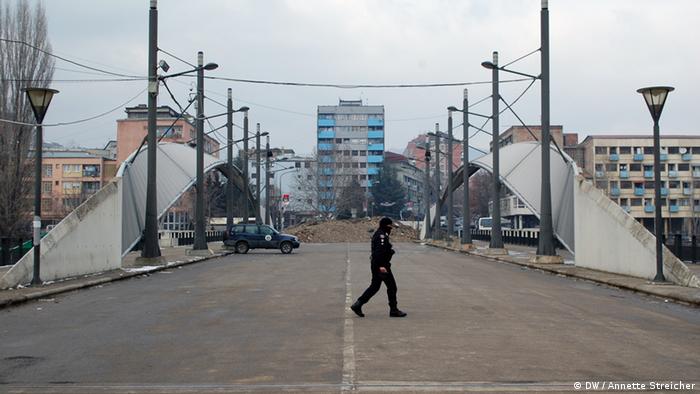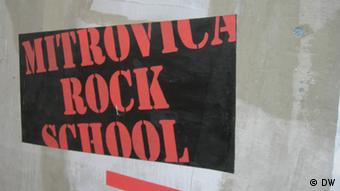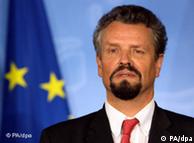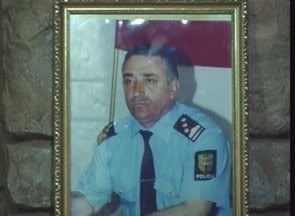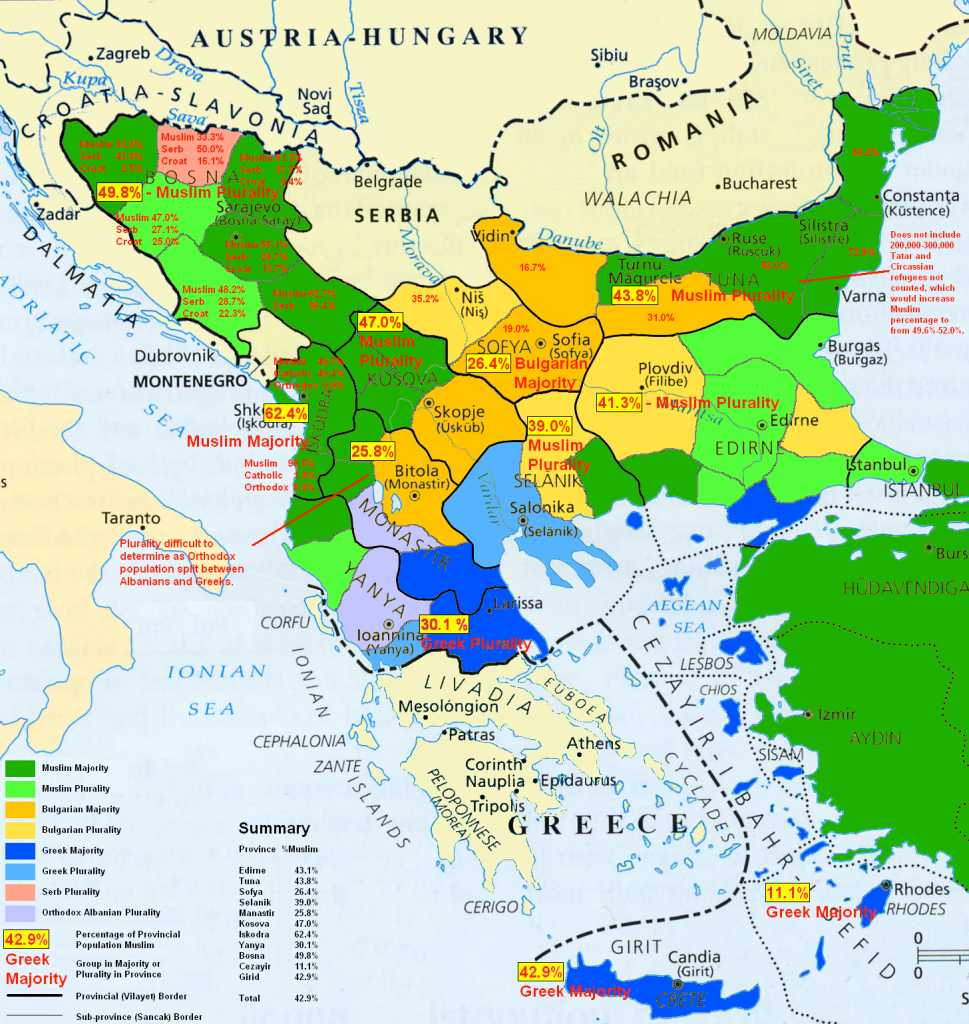So wie es seit Jahrzehnten auch in der Türkei war! Kosovo ist nicht nur Drehschreibe, für Drogen und Menschenhandel, sondern ebenso Tummel Platz von
Islamischen Terroristen und Extrem Organisationen.
Kosovo is one of Europe's majority Muslim countries, but now an administrative order has been issued banning the wearing of headscarves in schools.
When one student refused to remove her headscarf, she was expelled.
Al Qaeda in KosovoBy M. Bozinovich
"It's not true there were mujahideen in Kosovo. That is a figment of your imagination."
Sabit Kadriu, Albanian ‘human rights’ activist in Kosovo while testifying against Milosevic at the Hague
At the April's
international police conference held in Sofia, Bulgaria reiterated that Islamic terrorism is creeping up in the Balkans. Speaking at a regional police anti-crime conference, Bulgarian General Boiko Borisov
urgedfor "joint efforts to fight the global terrorism network" calling on the participants from the likes of Germany, Albania and Turkey to join efforts in limiting militants' access to financing and to enhance security of transport and border control. Earlier in March, the Bulgarian spy chief Kircho Kirov issued
a more specific warning on presence of al Qaeda in the Balkans and bluntly stated that extremists with links to Osama Bin Laden's Al Qaeda network are present in the Balkans and are infiltrating other European countries. In a joint NATO-Bulgarian report published in March 2005, Kirov cities Kosovo as a direct source of regional instability and a hub for international terrorism.
Indeed, speaking by proxy is nothing new, so these broad and sweeping statements by Bulgaria are significant because it is the US with its FBI offices in Sofia that ultimately stand behind these statements. What is not new is that Washington itself, as usual, has elected to remain mute on the specific al-Qaeda presence among Kosovo Albanians so one is left to search for the terrorist dots elsewhere in order to connect them.
For example, Reuven Paz, who teaches at Haifa University and is regarded as one of Israel's leading researchers of radical Islamic movements, says that the Islamic countries and particularly Saudi Arabia view the conflicts in Kosovo as that of Islam against Christianity. "All of the Sunni Muslim groups as well as Iran are making lots of propaganda for Kosovo and see it as a symbol," Paz said. The reason for the propaganda is to attract Muslim volunteers to go to Kosovo and fight. Al-Qaeda then is the only well established network that can provide such a trip for a young prospective Muslim eager to do his Islamic tour of duty and willingly die for Allah.
While reports abound that Bosnian Jihadists simply swerved upon Kosovo during the 1995-1999 period, Jane's International Defense Review reported that some fresh Jihadists were entering Kosovo via Albania as well. In February 1999 Jane's cites that documents found on the body of a KLA member showed that he had escorted several volunteers into Kosovo, including more than a dozen Saudi Arabians.
A more specific case is that of a
Syrian-German businessman, Mamoun Darkazanli, who was arrested in Hamburg in October of 2004 on charges that he “helped fund the al-Qaeda terrorist network for years and who is seen in a video at a mosque with some of the Sept. 11 hijackers.” According to the Hamburg authorities, “Darkazanli is alleged to have been involved in the purchase of a ship for bin Laden, handling administrative details, and paying bills. He also allegedly traveled to Kosovo in late 2000 on an al-Qaeda mission”.
In 2003, NBC News acquired a videotaped statement of Muhammad Talal al-Jafar al Tallani Ackbar al-Walid, described as al-Qaeda's Deputy Under-Emir for Defensive Intelligence and Holy War Operations, denouncing US and calling for world Jihad against the West. The report then goes on to describe Muhammad Talal as one that was “involved in noteworthy military operations in the past, serving in covert operations alongside the CIA in Afghanistan and in Bosnia and Kosovo before joining al-Qaeda.” The report cites that American soldiers Lt. Gen. William Boykin and Will Dunham contributed to the report.
Alarmed that
al-Qaeda may hit Britain during the run-up to the May 5 general elections, UK says that "the main threat is posed by around 200 people based here who have been trained by al Qaeda in Afghan camps for conflict in places such as Chechnya, Bosnia and Kosovo."
Also stated as an inadvertent afterthought that al-Qaeda is in Kosovo came few weeks earlier by the
FBI citing an arrest warrant for a certain Kifah Wael Jayyousi accused of "conspiring with two other men in the 1990s to finance, recruit and provide equipment to extremists fighting in Bosnia, Chechnya, Kosovo and Somalia."
The question then is no longer whether al-Qaeda is in Kosovo, but rather how could al-Qaeda have infiltrated Albanian inhabited areas of the Balkans precisely during the period when the US was blanketing it with its own troops.
The Albania RomanceFollowing the collapse of Stalinism in Albania, the newly elected President Sali Berisha quickly decided to leverage his strategic European location and Islamic heritage by placing his country on sale to the highest Muslim bidder and acquire money from that Islamic sponsor.
According to the IWPR“The Islamic connection [in Albania] can be traced back to 1992, when the Tirana-based Economic Tribune published a letter from Berisha to his prime minister, Aleksander Meksi, in which he said was going to help accept aid from Muslim countries because the West had not lived up to promises of financial assistance.”
Islamic countries, and especially Saudi Arabia, were long interested in using Albania as a hub via which to infiltrate Europe and Islamize it. Albania quickly became a distinguished member of world Islamic institutions, including the Islamic Conference and
The Islamic Development Bank.Although there is no indication that the US was alarmed of the new Islamic sponsors at the time, Washington initiated a takeover of Albania and dully began supplying direct assistance following Berisha’s visit to the US in March 1991 while in 1992 Washington deployed a Military Liaison Team to the country and started outfitting the Albanian military. Albania was subsequently used by the US and Turkey to provide supplies to Bosnian Muslims in their war against Serbs.
While US was instituting a military takeover of Albania, Albanian-Jihadist nexus was maintained by Albania’s Chief of Security Baskim Gazidede. Israeli Mossad documented that the
Security Chief Gazidede had extensive connections with the Jihadists and was the chief link between al-Qaeda, Albania and KLA. Says Albanian Gazeta Shqiptare: “'The Gazidede file', widely disputed of connections with the Islamics must have already been completed with data which 'Mossad' has gathered over the last years". Gazidede subsequently ran off to Syria, another terror sponsoring nation.
Before his departure to Syria, however, Gazidede established training camps across Albania and the often cited ones are in Tropoje and Bajram Curi. Given the influx of al-Qaeda into Albania it is then logical to conclude that these Jihadists had to have, at least, some form of an orientation meeting somewhere in Albania before let lose in Kosovo.
Indeed, reports abound that US, British SAS and German BND trained, equipped and used the Kosovo Liberation Army units, by now pregnant with al Qaeda Jihadists, were in Balkans to destabilize Serbia. In March of 2000, for example, London Times uncovered American agents that “admitted they helped to train the Kosovo Liberation Army [KLA] before Nato's bombing” of Serbia while in August of 2000 the KLA deputy chief of staff Colonel Dilaver Goxhaj gave an
interview to UPI stating that senior Albanian commanders were trained in Albania since 1991.
French Le Monde, furthermore, states that by “1996 the BND intelligence service was building up its offices in Tirana and Rome to select and train prospective KLA cadres. Special forces in Berlin provided the operational training and supplied arms and transmission equipment from ex-East German Stasi stocks as well as black uniforms.”
During March-May 1999 when NATO bombed Serbia, NATOs General Wesley Clark’s cell phone number was found among the killed KLA commanders in Kosovo.
Seized KLA weapons such as American Barrett M82 .50 cal sniper rifles along with German models, as well as reports of American 'Stinger' SAMs used by KLA Albanians during their war with Macedonia also point to the US-Albanian collaboration.
Finally, in February 2005,
German Network TV ZDF concluded that the Albanian “KLA has stronger ties with the CIA than the [German] BND. Commander Hoxha had ties with the CIA, the BND and with the Austrian military intelligence service which has devoted great attention to this region and has very good connections with the KLA."
Far from ignorant of al-Qaeda in Albania, the US appears to have had an uneasy relationship with them. Illustrates Tirana based Gazeta Shqiptare: “The arrests of Ahmed Ibrahim Al Naggar and Mohammed Hassan Mahmoud, and the extradition of the director of the Revival of Islamic Legacy foundation as a jihad collaborator in Tirana in June 1998, the arrest of Amoid Naji in Turin of Italy and his deposition before Italian investigators that he was in Albania to blow up the US embassy in Tirana, and other facts of this kind go to prove that the activity of terrorist jihad organizations is present and well-organized in Albania.”
Gazeta Shqiptare goes on to say that “Islamic terrorist organizations managed to set up Albania's first cell of the Islamic Jihad, which was headed by Aiman Al Zavahiri.” the famous Osama bin Laden No. 2.
Regarding Naggar, the
New York Times says that he is “the Jihad member, [who] tied Mr. bin Laden directly to the network in Albania”. The Times then provides a vivid detail: “Albania cell's members, most employed at Islamic charities in Tirana, were forced to transfer 26 percent of their salaries to Islamic Jihad.” The chief of the Albanian al-Qaeda, the Egyptian Shawki Salama Mustafa, moved in there with his wife Jihan Hassan, who later testified that their business was to turn out passports and that she “saw a passport with my name on it and it said I was Albanian".
According to the Global Policy, in addition to the drug and human trafficking,
Albanian criminal network in Brussells specializes in forging of documents and false passports. An al-Qaeda operative, Djamel Beghala, was arrested in Dubai after the customs agent recognized one of these Albanian type false passports.
What these reports suggest is that Clinton extended his "don't ask, don't tell" policy to Albania allowing it to assimilate al Qaeda within the Albanian KLA army and only then to provide the training, equipment and arms to them in order to wage war on Serbia. The "assimilation" part is what kept Clinton safe from being accused of being in bed with the al-Qaeda.
Since 9/11, the original madate of waging war on Serbia appears to have been appended with a danger sign: "Our presence in the Balkans has not only promoted peace in the region, it has also enhanced our ability to conduct counter-terrorism operations." said Gen. Richard Myers in 2003 following his trip to
Camp Bondsteel in Kosovo.
Has the US established a firm enough infrastructure in the Balkans to combat the terrorist Islamic plague emanating out of the Albanian-dominated Kosovo?
The Bulgarian RomanceDenying Russia airspace in 1999 was historically unprecedented move by Bulgaria that initiated its gambit to be the Western spy proxy in the Balkans. During the bombing of Serbia that followed, moreover, Bulgarian intelligence agents were used to point sensitive targets in Serbia and later were inserted as a spy unit within the Dutch contingent of KFOR, the NATO army that runs Kosovo. The KFOR Commander Reinhardt was rather impressed by the Bulgarian spies so he extended their mission in order "to activate the collaboration with the Kosovo population in the spying and the collection of information".
To speed up the American intelligence approachment, Bulgaria made another gambit and removed Russia from the Bulgarian picture. Impressed by Bulgaria's removal of Russian spies out of their country, the
director of the FBI, Louis Freeh, said, "Bulgaria is a key strategic partner for the U.S., not just in the security area," and announced in March 2001 that FBI may open an office in Bulgarian capital Sofia.
In 2002, General Borisov was
summoned to the US and, to his delight, told that FBI will establish a permanent FBI office in Bulgaria.
In 2004, the
US Embassy in Bulgaria announced that a permanent office is in place and the mission is "to protect and defend the United States against terrorist and foreign intelligence threats."
This year,
FBI is undergoing an expansion that will open up 2,086 new spy jobs, 615 agent and 508 Intelligence Analyst positions, of which FBI plans to have permanent Legal Attachés in Bulgaria and Bosnia.
The
NATO-Bulgaria spying agreement also indicates that NATO has decided to make Bulgaria the spymaster not only for the Muslim Kosovo Albanians but of Chechens with whom Bulgaria once shared a common Stalinist brotherhood. The conspicuous Bulgarian spying on Chechnya along with Kosovo indicates that the US may be alarmed at the already reported Kosovo-Chechen terror network. In February of 2000, Russian intelligence from the Federal Security Service (FSB) made a claim that "Chechen warlords started buying up real estate in Kosovo... through several real estate firms registered as a cover in Yugoslavia” and have extensive ties with the Albanian organized crime figures in Kosovo whose relatives are involved in Kosovo politics and are seeking independence from Serbia.
Therefore, Bulgarian blunt claims that al-Qaeda is in Kosovo are not some haphazard blabber but rather a carefully orchestrated plan where the burden of spying and intelligence discovery is shifted away from the West because it is a diplomatic burden in their dealings with Kosovo Albanians who were their proxy fighters and a manufactured, and a well processed, ready-to-use pretext against Serbia.
Sidelining of SerbiaSensing the imminent decision to anoint Bulgaria as the Balkan spymaster, Serbian intelligence chief Momir Stojanovic gave an interview to the official government news agency Tanjug in February 2004 and said that Islamist militants - including al Qaeda - are actively operating in Kosovo, Albania and Macedonia.
While the official pretext for Stojanovic’s interview was to protest previous day's NATOs declaration that Kosovo operations are “a success and a benchmark for future NATO missions”, Stojanovic’s interview reads more like an invitation to the US rather then criticism.
Heavy on specifics, Stojanovic began touting that Serbia has "procured" loads of detail on al-Qaeda in the Balkans: “We have also procured evidence that Al Qaeda has its strongholds in Kosovo and northern Albania… and their activities have also been reported in western Macedonia", said Stojanovic then proceeded to make a direct sales pitch of Serbia to the US with the statement that Serbia has a well established spying infrastructure across the Balkans because the Serbian intelligence agents have been monitoring the Islamists for more than a year.
The then-Serbian Minister of Defense Boris Tadic, now President of Serbia, quickly denied Stojanovic’s claims although in September 2003 Tadic himself told a Macedonian newspaper that militant Islamic organizations are active in the region and are acting in concert. Tadic’s denunciation of Stojanovic’s statement was followed with a similar NATO statement that publicly trashed Stojanovic’s statement as another Serbian gibberish.
The trashing of Stojanovic effectively sidelined Serbia and sealed Bulgaria’s anointing as the Balkan spymaster.
That Stojanovic was not talking gibberish, however, was proved in December 2004 when an intelligence tip was made that al Qaeda operatives were planning to land in Kosovo capital, Pristina, and use the Albanian terror cells in Kosovo to attack US and the West but abruptly changed these plans and moved in to another Albanian stronghold in the village of Kondovo near Macedonia’s capital Skopje. The US took this intelligence tip seriously enough and
shut the US embassy and all US government offices in Skopje.
Washington MuteWhile American stubborn denial, and often a belittling public denouncing, especially of Serb sources, that al-Qaeda is in Kosovo may be politically motivated, it is, nevertheless, fueling delusional belief among Albanian public that al-Qaeda is not among them.
For example, Balkan Affairs Adviser for the
Albanian lobby group in Washington, the AACL, claims that “Bogus reports have proliferated since the bombing of New York’s World Trade Center about Bin Laden’s forays into Albania and the existence of mujahedin training camps in Kosova” and that those reports have Serbian origin. The problem with this spin is not that the followers of this lobby group get indoctrinated in believing statements that are contrary to the facts, but that the policy-makers close with the AACL may compromise the security of the US in that region. For example, the most notable recepient of Albanian money and
a great friend of AACL, Senator Joseph Biden sits on the powerful Foreign Relations Committe and is contempleting a presidential run in 2008.
Although reports on al-Qaeda's Kosovo presence by FBI, USA Today, New York Times or German papers hardly qualify as spin, the American silence on specifics of al-Qaeda in Kosovo also impacts the Serbian side. Infuriated by the silence, Serbian officials issue bellicose responses: “Belgrade should have done more and should have looked for partners in the fight against terrorism" laments Rada Trajkovic, a deputy of the President of the People council of the north Kosovo. Trajkovic is in effect, blaming Belgrade for its inability to translate presence of Islamic terrorists in Kosovo into a pro-Serb policy shift of the West on the issue of the Kosovo status.
Of course, having Milosevic give a presentation on al Qaeda in Kosovo is indeed the case where the messinger is killing the message, the case of the US Embassy shut down in Skopje indicates that the the likes of Stojanovic should be taken seriously. In fact, the
January 2005 reportof the Washington based
Center For Strategic & International Studies indicates that what Stojanovic has "procured" is taken seriously: "Al Qaeda’s influence in the Balkans was established a few years ago... Islamist extremist groups in the Balkans such as 'Vehabija', 'Crvena Ruza' (Red Rose), and 'Teratikt', which remain closely linked with Al Qaeda, are active in Kosmet..., Montenegro, Bosnia and Herzegovina, Albania, and Macedonia."
Furthermore, in eastern Kosovo's city of Pec, Wahhabies have established an orientation camp where holy Muslim warriors congregate around a recently erected Wahhabi mosque. The Mosque is run by certain Mahmutovic from Sjenica, a Serbian city in area of Sadzak that is a brewing hotbed of Islamic hatred of the West and the Jews. Sandzak is also the center of the Islamic Community, an outfit that governs Balkan Muslim Imams including the Albanian ones in Kosovo.
Based on these reports then, the map of al-Qaeda centers in Kosovo indicates a satellite-type organizational structure: KLA controls the center of Kosovo with Drenica as the stronghold with strategic satellite to the west near Junik necessary for control of smuggling routes from Albania. Just across from Junik range is Tropoje and Bajram Cura, another reportedly al-Qaeda centers in Albania itself.
The control of Shar Mountain range to the southeast can be used by al-Qaeda to send groups into Macedonia to wage violence there as well as maintain logistical support for their criminal enterprise in other al-Qaeda centers in western Macedonia such as the cities of Tetovo, Gostivar and Kichevo.
The reported Al-Qaeda presence in the Pomoravlje region in the East Kosovo appears to be the staging area for fomenting violence into southern Serbia while the northern al-Qaeda satellites such as in Bajgora, north of Mitrovica, is there to foment fear among Serb communities in Mitorvica, most sizable in Kosovo, and thus give them an incentive to leave. The reports also indicate that a so-called Abu Baqr Sadiq mojahedin unit is operating in southern Mitrovica, indicating that the city is surrounded and ready to be cleansed of Serbs at the next outbreak of violence in Kosovo that may dwarf the one that occured in
March 2004.
Could this be a deliberate set up that will be used as the pretext to allow the Serbian troops back into Kosovo according to the UN Resolution 1244? Or is a deliberate in the other direction: to finally exterminate all Serbs out of Kosovo?
One can interpret Washington's silence both ways.
![kla danger]()
from:
http://balkan-spezial.blogspot.com
Andere Angriffe gegen Menschen, die sich gegen Extremismus ausgesprochen hatten, führten zu keinen Verhaftungen. Xhabir Hamidi, Professor für Islamische Studien an der Universität Prishtina und prominenter Kritiker der Wahhabiten, wurde im Jahr 2008 von maskierten Männern geschlagen. Er glaubt, dass er wegen seiner Ansichten angegriffen wurde. Osman Musliu, ein Imam aus der Stadt Drenas, wurde 2009 in einer Moschee geschlagen. "Ich verlor das Bewusstsein, und meine Hand wurde gebrochen", berichtet er. "Ich habe mich immer gegen die Wahhabiten in unserer Mitte ausgesprochen."..http://derstandard.at/1358304927258/Radikaler-Islam-als-tickende-Bombe-im-Kosovo
![]()


 Special police teams from Austria and Holland have been included in this most extensive investigation ever being led by Serbian Prosecution for Organized Crime.
Special police teams from Austria and Holland have been included in this most extensive investigation ever being led by Serbian Prosecution for Organized Crime. 























